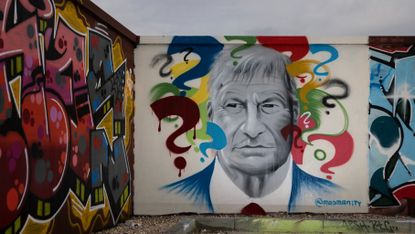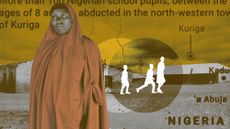Ali Harbi Ali: what are the potential motivations behind David Amess’s murder?
Police and security services said to be exploring a number of theories

Security sources investigating the murder of MP David Amess during a constituency clinic in Essex on Friday have said they are keeping an open mind about the motivation for his killing.
The political establishment was left shocked after the 69-year-old was fatally stabbed in a Methodist church in Leigh-on-Sea in his Southend West seat.
A 25-year-old suspect was arrested at the scene on suspicion of murder and later transferred to a London police station, where he was detained under the Terrorism Act. He has been named as Ali Harbi Ali, the British son a former senior Somali government official.
Subscribe to The Week
Escape your echo chamber. Get the facts behind the news, plus analysis from multiple perspectives.

Sign up for The Week's Free Newsletters
From our morning news briefing to a weekly Good News Newsletter, get the best of The Week delivered directly to your inbox.
From our morning news briefing to a weekly Good News Newsletter, get the best of The Week delivered directly to your inbox.
The Qatar connection
On Saturday, police said early investigations had revealed “a potential motivation linked to Islamist extremism”. But today The Times said security sources have “emphasised that all avenues were being explored as they examined the killing”.
One of these lines of enquiry, said the newspaper, is whether Amess’s ties with Qatar might be linked to his death. The Times described him as the British politician closest to the Gulf kingdom, which backs the current Somali president Mohamed Abdullahi Mohamed. The Conservative MP chaired the all-party parliamentary group on Qatar and had visited the country just last week.
“According to some observers, Somalia’s woes largely stem from the alliance Mohamed made with Doha,” said The Times’s David Rose. President Mohamed clung on to power when his four-year term was due to end in February, triggering the worst political violence the country had seen for many years.
Fears of Qatar’s increasing hold has provoked “a backlash from young Somalis, who express their anger on social media, too afraid to take to the streets”, he added.
MI5 ‘mystfied’
Another theory reported in The Telegraph is that Amess was not specifically targeted, but “picked at random as part of a plot to kill any national politician”.
Investigators believe Ali acted as a “lone wolf” in what they call a “low-sophistication” plot with little planning, said the paper. One source inside government told the Telegraph that Amess was simply “unlucky”.
The newspaper said this theory would appear to “scotch” claims that Amess, a devout Catholic, was selected “because of his values, views or religion”.
The Daily Mail said that MI5 was also “mystified” as to why Amess might have been singled out.
The Prevent referral
Ali is understood to have been referred to the flagship anti-extremism scheme Prevent in his “late teens”, which coincided with “a deterioration in his relationship with his Somali-born parents”, said the Mail.
However, he was “never a formal subject of interest to MI5”, said the BBC, which explained that engagement in the Prevent scheme is “voluntary and it is not a criminal sanction”.
“Teachers, members of the public, the NHS and others can refer individuals to a local panel of police, social workers and other experts who decide whether and how to intervene in their lives,” it added.
Radicalisation
Police and security services believe the motivation behind the attack may have been to “further the Islamist cause espoused by groups such as al-Qaeda, Islamic State and al-Shabab, which is active in Somalia”, said The Telegraph.
Ali does have Somali heritage, it added, but he was born in the UK, grew up in Croydon and it is not thought he had made any recent trips there.
His father, Harbi Ali Kullane, a former director of communications for the prime minister’s office in Somalia, was a victim of Islamist death threats himself, said The Telegraph. Al-Shabaab, the terror movement that still controls parts of the country, had reportedly targeted him over the hard line he took against terrorism when he lived in the country.
Kullane, who now lives in north London, told The Sunday Times that he was feeling “very traumatised” after his son was arrested. “It’s not something that I expected or even dreamt of.”
So far, Whitehall sources say there is nothing to suggest Ali had extensive contact with terror groups abroad, said The Independent. But detectives are thought to be looking at the possibility that he “may have been ‘self-radicalised’ online by material found on the internet and social media networks during lockdown”.
Create an account with the same email registered to your subscription to unlock access.
Sign up for Today's Best Articles in your inbox
A free daily email with the biggest news stories of the day – and the best features from TheWeek.com
-
 Who actually needs life insurance?
Who actually needs life insurance?The Explainer If you have kids or are worried about passing on debt, the added security may be worth it
By Becca Stanek, The Week US Published
-
 Sexual wellness trends to know, from products and therapies to retreats and hotels
Sexual wellness trends to know, from products and therapies to retreats and hotelsThe Week Recommends Talking about pleasure and sexual health is becoming less taboo
By Theara Coleman, The Week US Published
-
 Is the AI bubble deflating?
Is the AI bubble deflating?Today's Big Question Growing skepticism and high costs prompt reconsideration
By Joel Mathis, The Week US Published
-
 Is animal cruelty getting worse?
Is animal cruelty getting worse?Today's big question A new report has revealed a sickening trend of catapult animal killings shared on WhatsApp, and incidence of harming pets is rising
By Richard Windsor, The Week UK Published
-
 Why are kidnappings in Nigeria on the rise again?
Why are kidnappings in Nigeria on the rise again?Today's Big Question Hundreds of children and displaced people are missing as kidnap-for-ransom 'bandits' return
By Julia O'Driscoll, The Week UK Published
-
 What is the new definition of extremism?
What is the new definition of extremism?Today's Big Question Michael Gove on a mission to 'push for more stringent measures to tackle extremism in the UK'
By The Week UK Published
-
 Haiti's mass jailbreak: what do gang leaders want?
Haiti's mass jailbreak: what do gang leaders want?Today's Big Question Gangs hope violence will bring down Prime Minister Ariel Henry amid a growing security and economic 'nightmare'
By The Week UK Published
-
 Deaths of Jesse Baird and Luke Davies hang over Sydney's Mardi Gras
Deaths of Jesse Baird and Luke Davies hang over Sydney's Mardi GrasThe Explainer Police officer, the former partner of TV presenter victim, charged with two counts of murder after turning himself in
By Austin Chen, The Week UK Published
-
 Brianna Ghey: should killers have been named?
Brianna Ghey: should killers have been named?Talking Point Teenagers Scarlett Jenkinson and Eddie Ratcliffe now face 'life of inescapable notoriety'
By Jamie Timson, The Week UK Published
-
 Can the UK's knife crime 'epidemic' be tamed?
Can the UK's knife crime 'epidemic' be tamed?Today's Big Question Fatal stabbings are on the rise but campaigners are divided over punitive threats vs. public health interventions
By Harriet Marsden, The Week UK Published
-
 Post Office scandal casts new light on Robin Garbutt murder conviction
Post Office scandal casts new light on Robin Garbutt murder convictionSpeed Read Supporters claim faulty Horizon evidence was key to guilty verdict but victim's mother accuses former postmaster of jumping on bandwagon
By The Week UK Published